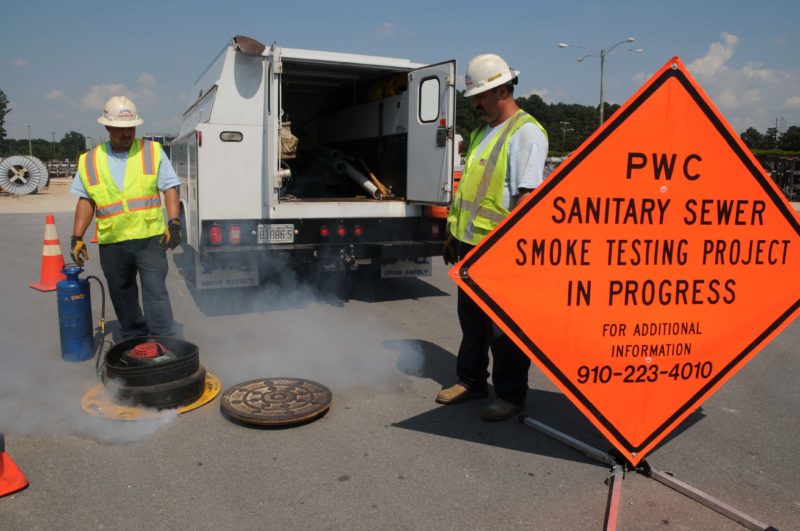Smoke Testing

The Fayetteville Public Works Commission conducts a comprehensive inspection of PWC sewer lines that feed the Rockfish Creek and Cross Creek Water Reclamation Facilities.
Inspections will be conducted in various locations throughout the PWC sanitary sewer system. To view MSDS information on the smoke, click here.
PWC crews regularly inspect sanitary sewer lines using a smoke test to locate breaks and defects in the sewer systems. Smoke testing involves ‘injecting’ a non-toxic white to gray colored smoke into sewer lines through manholes located within public streets and utility easements.
Under normal conditions, residents will see smoke come through the roof vent at the top our your home indicating you are connected to the sewer system. In some cases where homes or building have defective plumbing or dried up drain traps, the smoke will enter a home or building. If traces of the smoke or its odor enters the building, it is an indication that gases and odors from the sewer may also enter. The smoke is manufactured specifically for these purposes and leaves no residuals or stains and is not harmful to humans, plants or animals. It is manufactured by HURCO technologies (1-800-888-1436).
If smoke enters your home, it may be an indication of common problems including: Vents connected to your sewer pipe are inadequate, defective or improperly installed; Traps under sinks, tubs, basins, showers, and other drains are dry, defective, improperly installed, or missing; or Pipe connections, and seals of the wastewater drain system in and under your building are damaged, defective, have plugs missing, or are improperly installed.
The correction of any defects in pipes and sewer on private property is the responsibility of the owner. The services of a professional plumber are advised.
During the inspection project, signs will be placed in neighborhoods where smoke testing is occurring. Customers may also call 223-4010, for additional information.
PWC will notify local fire departments as testing is conducted in the area. When testing involves your neighborhood, residents can help by informing your family, neighbors or employees about the testing and potential smoke. Be aware that if smoke enters, it may cause smoke alarms to sound.
FAQ
What is smoke testing and why is PWC doing it?
PWC crews regularly inspect sanitary sewer lines using a smoke test to locate breaks and defects in the sewer system.
How does PWC perform the smoke testing?
A non-toxic, grayish-white colored smoke is “injected” into sewer lines through manholes. The smoke will escape through breaks in the line indicating where problems may
be. It may appear from unsecure manholes, storm drains, uncovered or damaged cleanouts, and even up through the ground.
What is a cleanout and how could it be damaged?
A cleanout is an access cap or cover designed for entering and maintaining sanitary sewer lines. In most cases, PWC has a cleanout access cap within the utility right of way
boundary or at the edge of a utility easement. Residents will typically have a cleanout access cap on the property near the home or business. The most common cause of damage is by vehicular traffic and lawn mowing/yard maintenance.
Will I see the smoke during the testing?
Under normal conditions, customers connected to the sanitary sewer system will see the smoke come through the roof vent at the top of their home or business. If your home or business has defective plumbing or dried up drain traps, the smoke will enter the residence or building. If traces of the smoke or its odor enter the residence or building, it is an indication that gases and odors from the sewer may also enter.
Where is the smoke testing being done?
Smoke testing is being conducted throughout PWC’s entire sewer service area.
When is the smoke testing being done?
Most smoke testing is conducted Monday-Friday between the hours of 8:00 am – 4:00 pm.
How long does it take to complete the smoke testing?
Depending on the size of the area being tested, which is usually neighborhoods or clusters of streets, it could take several weeks or up to several months to complete the testing for that area.
Is the smoke harmful to humans or animals?
While the smoke has a distinctive, but not unpleasant odor, it is not harmful to humans, animals, or plants. It leaves no residues or stains.
Do I need to be home during smoke testing?
No, it is not necessary for anyone to be at home while the smoke testing is being performed. However, if you are experiencing sewer odor issues, you may wish to be there in order to observe any smoke that may be entering the structure through faulty plumbing.
Will I be contacted if PWC notices a problem at my home?
Typically, there is no way to know if problems exist within the structure; however, if an obvious problem is noted within the customer’s area of responsibility, they will be notified.
What happens if I see smoke inside my home or business?
If smoke enters your home or business, it may be an indication of common problems including:
• vents connected to your sewer pipe are inadequate, defective, or improperly installed
• traps under sinks, tubs, basins, showers, and other drains are dry, defective, improperly installed, or missing
• pipe connections and seals of the wastewater drain system in and under your building are damaged, defective, have plugs missing, or are improperly installed
What is a dried up drain trap?
When drains are unused for extended periods of time, or not properly maintained, the water that would normal remain in the “goose-neck” section of piping evaporates or “dries up.” When that happens, sewer odors and gases can pass back through the internal plumbing into home or business structures. It is important that drains see some regular activity to avoid
this issue.
Who is responsible for correcting these problems?
The correction of any defects in pipes and sewer systems on private property is the responsibility of the owner. The services of a licensed professional plumber are advised.









